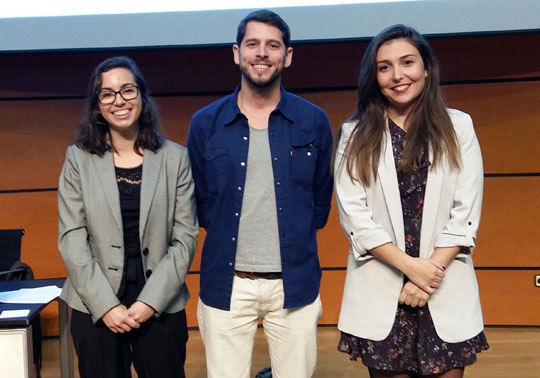
The researcher of the Institute of Integrative Biology of Systems (I2SysBio) Jorge Mariano Collantes has been the winner of the I Doctoral Theses Dissemination Conference of the University of Valencia, destined to provide information on the research of doctoral students of the academic institution. In the event, today in the Joan Plaça auditorium of the Botanical Garden, each one of the 21 selected theses have been defended in 3 minutes. The award is a stay at Harvard University valued at €2,000.
The second prize (€500) went to Marta Reguera, from the Faculty of Pharmacy, with the exhibition “Schistosomiasis Urinaria: una enfermedad tropical llamando a las puertas de Europa”. The third, €300, to Mónica Martínez López-Sáez, of the Faculty of Law, with “La garantía del Derecho al Olvido: protección de datos, retos futuros y propuestas de regulación de situaciones de vulnerabilidad en la Unión Europea”.
“The doctorate is the highest degree that can be obtained in the university. It contributes a lot to the one who does it, but it also contributes quality to the institution and is a way of transferring the generated knowledge. This conference contributes to the dissemination of knowledge in Valencian Society”, said Mavi Mestre, rector of the University of Valencia. For his part, the director of the Doctoral School, José Vicente Bagán, has highlighted “the great scientific level of theses presented, which is a pride for the university community”.
“My work deals with the functioning of biological clocks and what genes are involved in them. How organisms understand time, seasons or cycles to regulate themselves”, said Jorge Mariano Collantes (Corrientes, Artgentina, 1986). The researcher, who has been working on this issue for seven years and who was a finalist in the FameLab science dissemination contest in 2015, highlighted that he likes scientific dissemination and has asked for more activities of this kind.
The conference has been organised by the Doctoral School and the Unit of Scientific Culture and Innovation of the University of Valencia and with the collaboration of the Polibienestar Institute. The Vice Chancellor for Internationalisation and Cooperation, Carles Padilla, who has handed out the prizes; and María Dolores Real, vice-rector of Innovation and Transfer, also attended the event.
At the event, Pere Estupinyà, scientific communicator and writer, delivered the lecture “De l’acadèmia a la comunicació científica: una experiència professional”, in which he explained the need to make the scientific message more flexible and adapt it to the format and to the public. “Some scientists are not able to do it.” The disseminator has also addressed the doctoral students at the event proposing them to be proactive, and he has cited himself as an example, his participation in television programs such as Redes, the books he has written and his constant updating.
On his behalf, Martí Domínguez, head of scientific magazine Mètode, delivered the lecture “El repte de divulgar”. In his historical overview of dissemination, he recalled the figures of Galileo, Newton, Darwin and Einstein, until the twentieth century. The professor of Journalism at the University of Valencia has also addressed the “conflict” between the scientific and journalistic fields, and their current episodes, with media without specialised journalists, to give an example; or institutions with personnel that do not make an effort to disseminate.
The examining board has been formed by José Vicente Bagán; the researcher from the Language Theory and Communication Sciences Department Bejamín Marín; Carme Agustí, researcher of the Department of Cell Biology, Functional Biology and Physical Anthropology; Lucía Sapiña, Ph.D. student at the University; and Pere Estupinyà.
The criteria for the evaluation of the best works have been the content of the exhibition (interest of the investigation, explanation clarity of the objectives and methodology, 4 points); creativity and originality in the form of speech (structure, intonation, speaking speed, visual contact with the public, with up to 3 points) and the use of simple language, correct use of syntax and non-sexist language (3 points).
Videos of I Doctoral Theses Dissemination Conference of the University of Valencia:



,0.png)











